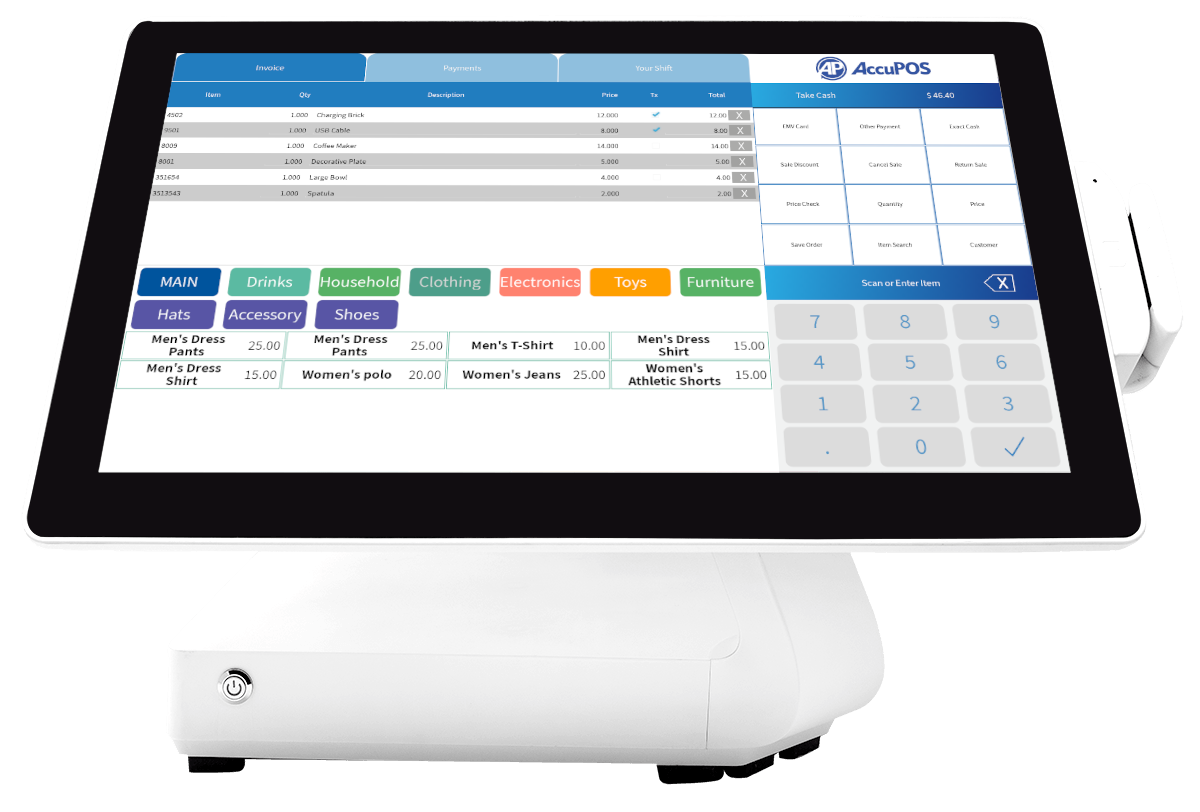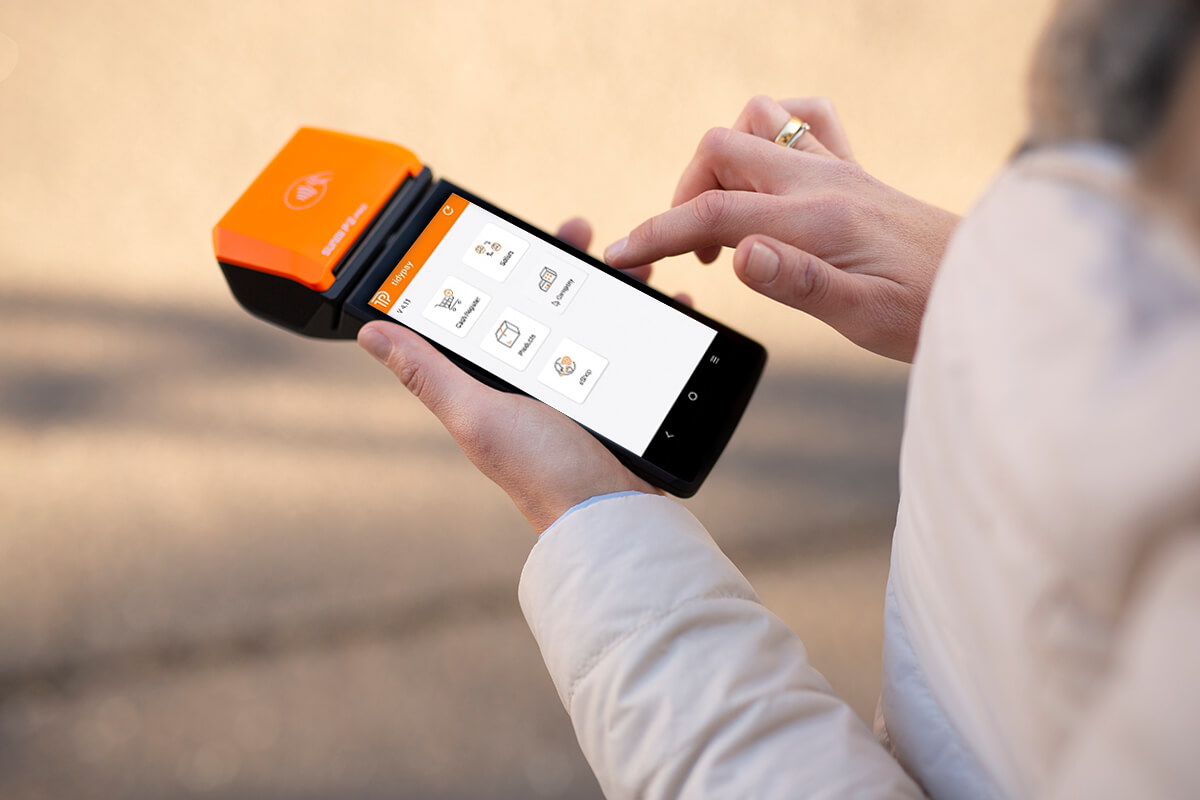Not known Details About Point Of Sale Systems
Not known Details About Point Of Sale Systems
Blog Article
6 Simple Techniques For Pos Software

Point of Sale Software: Retail Point-Of-Sale Solutions Streamline Deals
See This Report on Point Of Sale Software

Hardware Components of a Point of Sale System What makes a POS system tick? It's not just software application; the hardware plays a starring function. Think about it as the body to the software application's brain. Without the ideal hardware, even the most sophisticated POS software is just a pretty face. Vital POS Hardware So, what are the must-haves? Let's break it down. The main processing unit, frequently a computer system or tablet, is the heart of the operation. The screen or touchscreen show allows personnel to communicate with the system. A barcode scanner accelerate the checkout procedure. Keep in mind the days of manually getting in each code? The trusty receipt printer provides consumers with a record of their purchase. A cash drawer keeps your money safe and arranged. A card reader enables clients to pay with credit or debit cards. Diving Deeper: Beyond the Essential But wait, there's more! Depending on your business, you may need specialized hardware. A restaurant might integrate kitchen area printers to relay orders, while a retail shop may utilize label printers for item tagging. Ever wonder how website your local pastry shop quickly prints those delicious-looking labels? Selecting the Right Hardware: A Balancing Act Picking the ideal hardware isn't simply about purchasing the most expensive equipment. It has to do with discovering the sweet area in between performance, toughness, and budget. A little business simply starting out may select a more basic setup, while a high-volume merchant will require robust, high-performance makers. Is it better to purchase new or used? Consider your options thoroughly. A brand-new system uses the latest innovation and guarantee protection, however a reconditioned system can save you cash. The Future of POS Hardware What does the future hold? Anticipate to see a lot more integration with mobile gadgets, biometric scanners for employee authentication, and advanced analytics control panels displayed on bigger, clearer screens. Envision a world where inventory is instantly updated in real-time as products are scanned-- a world where you can track your best-selling item from anywhere in the world. The possibilities are endless, and the hardware is continually evolving to satisfy the demands these days's businesses. Are you ready to update your point of sale system?
Software Application Characteristics and Capabilities: The Heart of Your POS System
Ever enjoy a skilled barista move through a busy morning rush? Their secret isn't just caffeine; it's a smooth dance with their POS system. The software application is the conductor of your organization symphony, orchestrating everything from sales to inventory. What notes should you be listening for? What abilities truly matter in today's market?
Inventory Management: Beyond Counting Beans
Forget spreadsheets that haunt your dreams. Modern POS systems use real-time stock tracking, informing you when your stock of artisanal coffee beans dips precariously low. Believe of it as a digital guardian angel, preventing those awkward "Sorry, we're out!" moments to clients. What if you could likewise predict demand based on historic data? Numerous systems now offer forecasting tools, an effective weapon versus overstocking and lost sales. This assists prevent the situation of lacking popular products or accumulating excess inventory of slow-moving products, both of which can constrain money circulation and space.
Sales Reporting and Analytics: Translating the Data
Sales information is the brand-new gold, and your POS system is the miner. Forget simply knowing how much you sold today. Dive deep into the information to uncover trends, recognize your best-selling items, and understand customer behavior. Which menu product pairs completely with the everyday special? Which promotion resonated most with your customers? These insights are not simply interesting; they're actionable intelligence. Without reliable sales reporting, browsing the complexities of company decision-making ends up being like sailing without a compass, increasing the possibility of mistakes and missed opportunities.
Client Relationship Management (CRM): Structure Bridges, Not Walls
Keeping in mind a regular customer's name and preferred order is charming, however scaling that individual touch is difficult. POS systems with CRM capabilities permit you to track consumer purchase history, preferences, and even birthdays. Imagine immediately offering a discount rate on their birthday-- a little gesture that cultivates commitment and encourages repeat organization. However there is the potential snag of bad data quality, which can result in inaccurate consumer profiles and inadequate marketing efforts.
Payment Processing: Enhancing the Transaction
The checkout experience can make or break a sale. Smooth integration with different payment methods-- charge card, mobile wallets, even copyright-- is non-negotiable. Can your system handle split payments? Does it offer protected tokenization to secure consumer information? A cumbersome payment procedure resembles striking a sour note in your company symphony, potentially interfering with the whole performance. Ensuring compatibility with progressing payment technologies and adherence to security standards are critical for maintaining client trust and functional efficiency.
Worker Management: Keeping the Group in Sync
From clocking in and out to handling approvals and tracking efficiency, worker management includes streamline operations and enhance responsibility. Is scheduling a problem? Numerous POS systems provide incorporated scheduling tools, enhancing staffing levels based upon forecasted demand. A common barrier that is typically ignored is the challenge of integrating staff member management functionalities with payroll systems, which can cause errors and inadequacies in wage computations.
Advanced Characteristics: Leveling Up Your Operations
- Table Management: Perfect for dining establishments, this function allows you to imagine your dining space, track table status, and manage reservations.
- Commitment Programs: Reward your finest clients and motivate repeat service with integrated loyalty programs.
- Online Purchasing Combination: Seamlessly incorporate your POS system with online ordering platforms to expand your reach.
Picking the ideal POS system has to do with more than just functionality; it has to do with finding a partner that can grow with your service. Consider your existing needs, expect future development, and do not hesitate to ask the tough concerns. The best software application can change your service from a disorderly cacophony into an unified work of art.
Industry-Specific POS System Applications
Think about the regional bakery, busy with early morning consumers craving fresh croissants. A generic POS system might deal with transactions, however can it manage complicated recipes, track component inventory, or immediately adjust production schedules based upon sales information? Probably not. That is where the beauty of industry-specific POS systems shines.
Restaurants and Hospitality
For busy restaurants, speed and precision are paramount. The number of times have you seen servers juggling orders, adjustments, and splitting costs, all while attempting to provide outstanding service? A dining establishment POS system enhances these processes, allowing for table management, kitchen order tickets, and even online ordering integration. These systems often consist of features like ingredient-level inventory tracking, important for managing food expenses and lessening waste. Ever question why your favorite meal is often not available? It may stem from a lack of correct stock management.
- Table Management
- Cooking Area Order Tickets
- Online Ordering Combination
- Ingredient-Level Inventory Tracking
Retail Solutions
Retail, with its diverse stock and consumer interactions, requires a different set of tools. Envision a shop clothing store having a hard time to keep an eye on sizes, colors, and seasonal collections using a fundamental checkout system. An industry-specific retail POS system provides features like barcode scanning, consumer loyalty programs, and in-depth sales reporting. These systems can even incorporate with e-commerce platforms, offering a smooth omnichannel experience for clients. Did you understand some retail POS systems can predict future sales patterns based on historical data? Now that is effective!
The Perils of a Mismatch
Picking the incorrect POS system can produce substantial functional obstacles. A clothing store utilizing a dining establishment POS, for instance, would discover it unsuitable for handling stock with sizes and colors. The absence of proper reporting and analytics might result in mistaken purchasing decisions and lost profits. The result could be similar to attempting to fit a square peg in a round hole.
Key Factors to consider
Selecting an industry-specific POS system requires cautious examination. Consider your service's special requirements and functional workflows. Does the system integrate with existing software application? Does it use the essential reporting abilities? Is it scalable to accommodate future development? A well-chosen POS system is not just a deal tool; it's a tactical property that can drive effectiveness, enhance customer satisfaction, and ultimately, improve your bottom line. Remember, it is a financial investment in your organization's future, not just an expenditure.
Security Factors To Consider for Point of Sale Systems
Ever heard the tale of the mom-and-pop shop that lost everything because of a single, ignored security flaw in their POS system!.?. !? It's a cautionary tale, and it highlights an important element typically overshadowed by the appeal of fancy features and streamlined operations. The truth is, a POS system is just as great as its security. What excellent is a system that crunches numbers in a flash if it allows lawbreakers to swipe client's information simply as quickly?
The Vulnerability Minefield
The digital landscape is a battleground. Every POS system, despite size or sophistication, is a potential target. Are you truly got ready for the risks prowling around the corner? The genuine pinch comes when you discover that your out-of-date software application has a gaping hole that hackers can make use of, turning your service into an unwitting accomplice in identity theft. The problem is that hackers are crafty and are always altering their strategies.
Typical Security Gaps and Specialist Tips
- Weak Passwords: "Password123" isn't cutting it. Usage strong, unique passwords for all POS system accounts and change them frequently. Two-factor authentication is a must.
- Unsecured Networks: Your Wi-Fi is like leaving the front door open. Secure your network with strong encryption (WPA3 if possible) and consider a different network for your POS system.
- Out-of-date Software Application: Software application suppliers spot security holes all the time. Failing to update is like welcoming problem. Set up automatic updates or schedule routine maintenance.
- Worker Training: Your personnel is your very first line of defense. Train them to recognize phishing efforts, secure passwords, and report suspicious activity.
Information File Encryption: Your Shield Against the Dark Arts
Think about data encryption as a secret code. It scrambles sensitive details, like charge card numbers, making it unreadable to unapproved users. Without file encryption, your consumers' monetary information are like sitting ducks, ripe for the selecting by cybercriminals. It's not simply about safeguarding your consumers; it has to do with securing your reputation and avoiding substantial fines.
PCI Compliance: The Rulebook You Can't Ignore
If you accept charge card, you're bound by the Payment Card Market Data Security Standard (PCI DSS) It's a set of security standards developed to protect cardholder information. Failing to comply can lead to fines, penalties, and even the loss of your ability to process charge card payments. It's a headache, yes, but it's a required one. Consider PCI compliance as the expense of doing service in the digital age.
Consider this: every transaction processed through your point of sale is a potential entry point for destructive actors. By implementing robust security measures, you're not simply securing your service; you're securing your consumers' trust and making sure the long-term viability of your operations. The security of your POS system isn't just a technical issue; it's a business important. It needs continuous alertness, proactive steps, and a commitment to staying ahead of the curve.